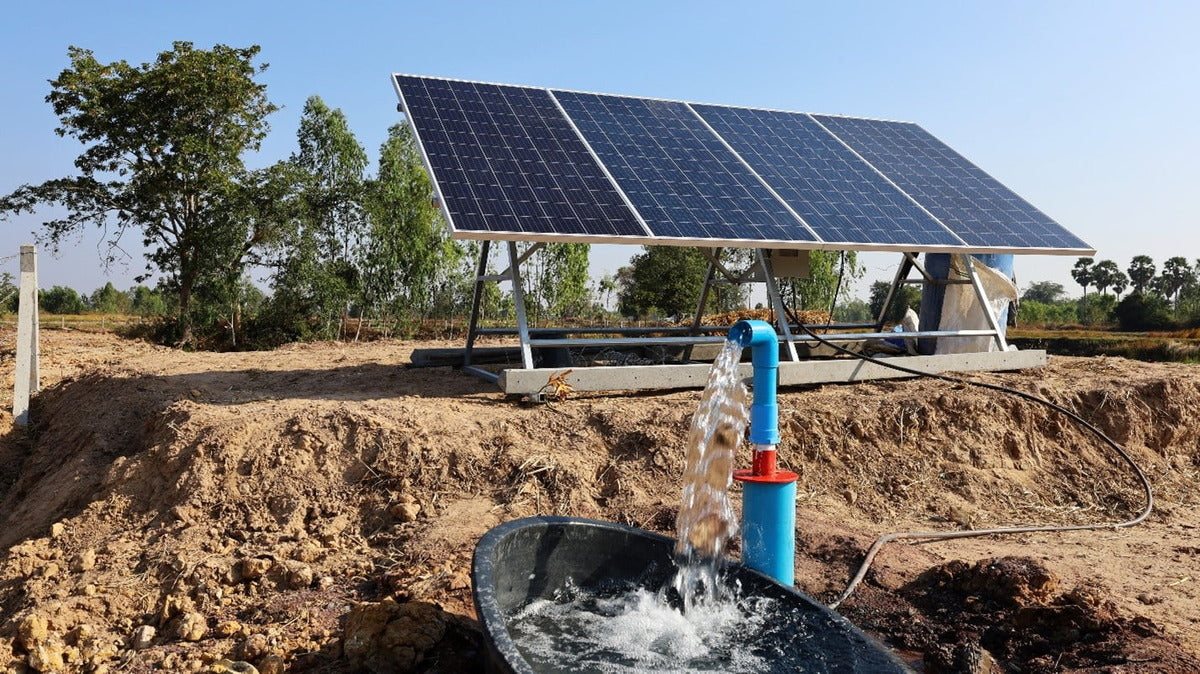Water scarcity is a major concern for Australian farmers, impacting agricultural output and livelihoods. As climate change worsens drought conditions and water resources decline, the need for sustainable water management solutions grows more pressing.
In this article, we will look at solar pumps as a feasible solution to water limitations on farms, including both scientific insights and practical guidance for implementation.
Tackling Water Scarcity: A Sustainable Solution for Australian Farmers
- Water scarcity has become a critical concern in Australian agriculture, with declining water resources threatening agricultural production, livestock health, and overall farm profitability.
- Traditional water pumping systems, which are frequently associated with high costs, high energy consumption, and reliance on scarce resources, are becoming increasingly unsustainable in the face of growing water scarcity issues.
- Solar pumps, on the other hand, are growing in popularity as a long-term option that uses the sun's plentiful energy to offer farmers a dependable and ecologically beneficial water source.
- Farmers can reduce their reliance on fossil fuels, lower greenhouse gas emissions, and reduce pressure on decreasing water reserves by utilising solar power, encouraging the long-term sustainability of agricultural operations in Australia.
The Impact of Water Scarcity on Australian Agriculture
- Water scarcity has a direct impact on crop production by reducing irrigation availability, resulting in lower yields and quality for a variety of crops.
- Water scarcity makes Australian farmers more vulnerable to droughts, resulting in crop failures, livestock losses, and financial strife.
- Water scarcity threatens the agricultural industry's productivity and economic viability, as farmers fight to maintain viable operations in the face of limited water resources.
- Limited water supply has an impact on watering livestock and well-being, resulting in dehydration, decreased milk production, and increased susceptibility to disease.
- Water scarcity contributes to environmental degradation, such as soil erosion, biodiversity loss, and habitat destruction, which exacerbates agricultural issues.
- Without sustainable water management methods, Australian agriculture faces further losses in production and resilience, emphasising the importance of solving water scarcity challenges.
Why Solar Pumps are a Game-Changer for Farm Water Management
- Solar pumps use renewable solar energy, giving them a more environmentally friendly option to standard pump systems that use non-renewable resources.
- Solar pumps have a wide range of potential uses in agriculture, including irrigation, livestock watering, water treatment, and home use, providing farmers with an adaptable answer for their water management needs.
- While the initial investment may be larger, solar pumps provide long-term cost benefits by lowering energy bills and maintenance expenses, resulting in a more cost-effective solution for agricultural water management.
- Solar pumps are built to last and require little maintenance, saving farmers time and money while providing reliable water delivery.
- Solar pumps can be installed in remote regions without access to a power grid, increasing rural farmers' water supply and irrigation capacities.
- Solar pumps are designed to survive extreme weather conditions, giving farmers a long-lasting and dependable water management option.
Selecting the Right Solar Pump for Optimal Water Supply
Choosing the right solar pump is important for ensuring an optimal water supply on your farm. When choosing a solar pump, keep in mind your water needs, well depth, and irrigation system design. With a range of products and capacities available, farmers can choose a solar pump that matches their specific needs.
For individuals seeking high performance and dependability, PS2 Solar Pumps are an excellent alternative. PS2 pumps use modern solar pumping technology to provide cost-effective, clean, and dependable pumping by harvesting free solar energy. The PS2 series, which ranges from 0.1Kw to 4Kw, provides various benefits, including no installation infrastructure, durability for off-grid areas, low running costs, and remote manageability via LORENTZ Connected.
Ensuring Water Security for Your Farm
Farmers may protect their businesses from the consequences of drought and climate change by using sustainable water management equipment such as solar pumps. Solar pumps are an ideal alternative for Australian farmers looking for a reliable water supply thanks to their dependability, low cost, and sustainability. Contact us at LORENTZ today and take your first step towards water security.
Frequently Asked Questions
How do solar pumps help in solving water scarcity on farms?
Solar pumps use the power of the sun to offer a consistent and sustainable water supply, decreasing reliance on scarce resources and alleviating the effects of water scarcity.
What are the key benefits of using a solar pump for farm water supply?
Reduced operational costs, low environmental effects, and improved resistance to drought and climatic variability are all significant advantages.
How do I choose the right solar pump for my agricultural needs?
When choosing a solar pump, consider water requirements, well depth, and irrigation system design, and get personalised guidance from a solar pump expert.
Can solar pumps be used during cloudy or rainy days?
While solar pumps may lose effectiveness in gloomy or wet conditions, they can still work with stored energy or backup power sources.
What maintenance is required for solar pumps in farm settings?
Routine repairs include cleaning solar panels, inspecting pump components for wear and tear, and assuring optimum system operation. Regular inspections and servicing by a certified technician are advised to ensure peak performance.






